This post may contain ads and affiliate links and we may earn a small commission when you click on the links at no additional cost to you. As an Amazon Affiliate, we earn from qualifying purchases. You can read our full disclaimer here.
Are Poodle Puppies Hyper? Unraveling Their Energetic Nature
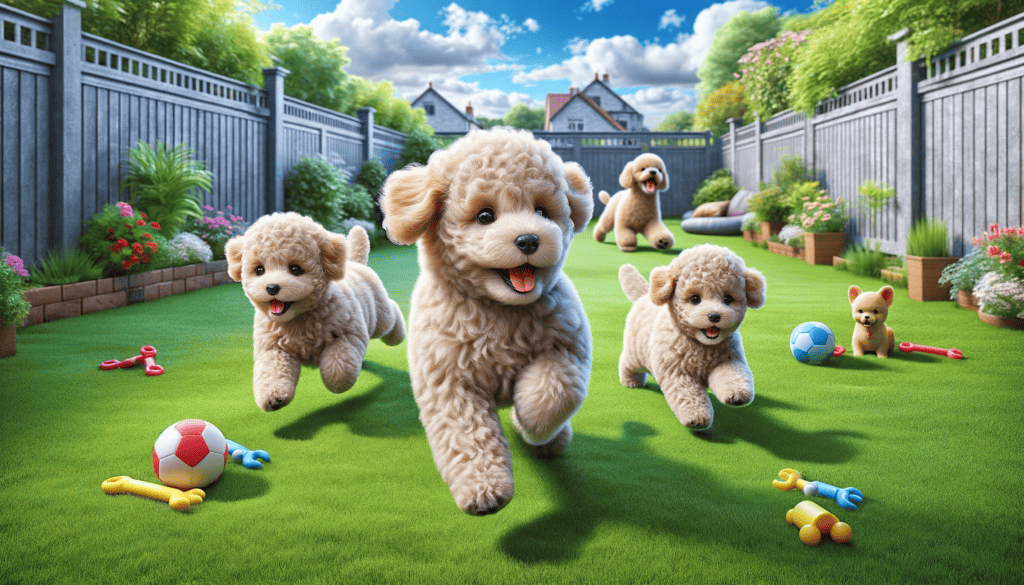
When considering bringing a poodle puppy into your life, you might wonder, “Are poodle puppies hyper?”
Spoiler alert: They’re basically furry little energy balls!
This query is as popular as poodles at a dog park, and rightly so, given their brainy reputation and zest for life.
Picture this: a poodle pup, bouncing off the walls, tail wagging like a metronome on overdrive. They’re not just hyper; they’re a whirlwind of puppy enthusiasm!
These mini mop-tops come with batteries included and no off switch, demanding plenty of playtime and brain games. They’re quite capable of driving you crazy…in the cutest way possible.
Their hyperness is their charm, a delightful (and exhausting) phase of puppyhood as they sniff, sprint, and somersault into your heart. So, gear up for the lively journey of raising a spirited poodle pup!
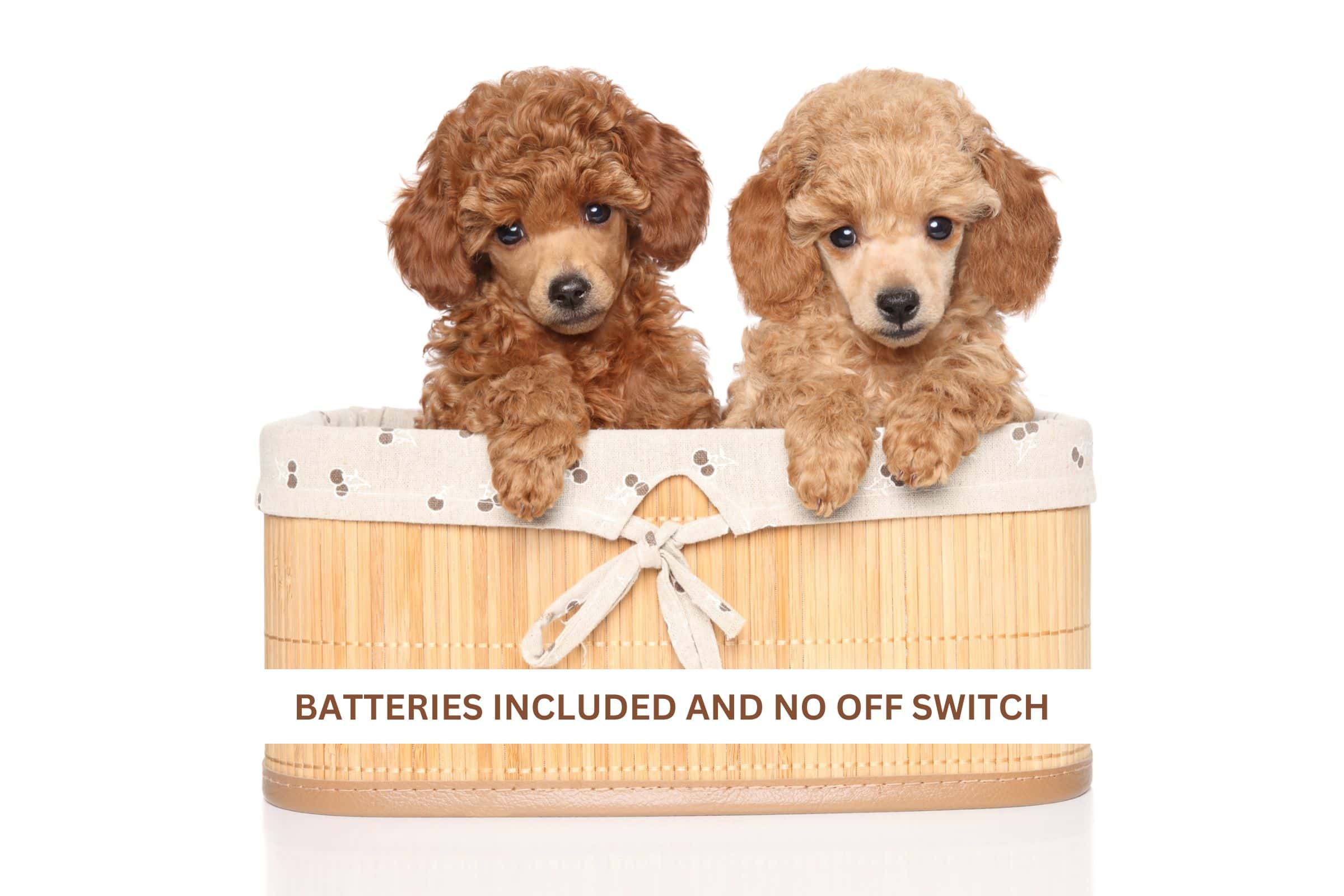
As a breed, poodles are often eager to please and can be trained to manage their excitability. Your experience with a poodle puppy can vary depending on how much attention and training you provide.
Ensuring your poodle puppy has a regular routine, including playtime, training, and walks, can help channel their energy positively. Remember that every puppy is unique, and while some may be more spirited, others might be calmer.
Understanding your puppy’s needs and behaviors is critical, so it’s helpful to learn about the breed’s characteristics. Poodle puppies are intelligent and can benefit greatly from early socialization and obedience training.
This foundation can help prevent behavioral issues linked to excess energy and ensure that your puppy grows into a well-adjusted adult dog.
Are Poodle Puppies Hyper? Start with Understanding Their Behavior

To understand if your poodle puppies are hyper, it’s important to review their typical behavior patterns, how various factors influence their energy levels, and what you can do to manage their liveliness.
In-Depth Look at Poodle Puppies’ Energy Quotient
Poodle puppies, irrespective of their size – be it the statuesque standard, the mid-sized miniature, or the diminutive toy variety – are bundles of boundless energy.
Their vivaciousness is a hallmark of the breed, necessitating a robust regimen of romps and activities to keep them both physically fit and mentally satisfied.
Exploring the Sources of Boundless Bounce
The hyperactive streak seen in poodle puppies can often be traced back to their genetic makeup and the environment they are raised.
Puppies descending from a lineage of industrious working dogs might naturally display a more pronounced zest, inheriting an energetic ethos from their ancestors.
Poodles have a moderate prey drive due to their history as water retrievers, but it varies per individual. Proper training can manage this instinct effectively.
On the environmental front, poodle pups cooped up in cramped quarters may respond by ramping up their activity levels, turning every nook and cranny into a playground. This can lead to an increase in what might be perceived as hyperactivity, as they attempt to expel their innate vigor in a limited space.
Proper exercise, engaging play, and a stimulating environment are critical in channeling their energy positively and ensuring a well-balanced temperament.
Poodle Puppy Development Stages
Poodle puppies embark on a dynamic journey from the moment they’re born until they reach full maturity. Initially, they exhibit a burst of energy, which is a natural aspect of their growth and curiosity.
This period is characterized by a flurry of activity as they learn and explore their environment. As they grow, their excessive energy begins to level out. They become more measured and controlled in their behavior.
This maturation process is a gradual transition from the frenetic pace of puppyhood to the more composed demeanor of adulthood, reflecting changes in their physical and mental development.
Here’s a table outlining the general stages of poodle puppy development:
| Stage | Age Range | Description |
|---|---|---|
| Neonatal Period | 0-2 weeks | Dependent on the mother, limited movement, beginning to develop senses. |
| Transitional Period | 2-4 weeks | Eyes/ears open, start to walk, initial energy bursts appear. |
| Socialization | 4-12 weeks | High energy, exploration, learning social cues, beginning of training. |
| Juvenile | 3-6 months | Continued growth, energy starts to stabilize, more structured learning and behavior. |
| Adolescent | 6-18 months | Energy levels out, testing boundaries, maturing into adult behaviors. |
| Adult | 18+ months | Settled behavior, consistent energy, fully developed physically and mentally. |
During each of these stages, a poodle’s energy levels and behaviors will vary, requiring appropriate care and training to ensure a healthy development.
Recognizing Signs of Hyperactivity in Poodle Puppies
Identifying hyperactivity in your poodle puppy is crucial for their well-being and your peace of mind. Hyperactivity isn’t just a bit of extra energy; it’s a constant and often overwhelming state that can be challenging for both the puppy and owner.
Key indicators include:
- Excessive Barking: Constant, loud, and often unnecessary barking at all hours, significantly more than a typical puppy might exhibit.
- Non-stop Jumping: An inability to remain still, with a tendency to jump on people, furniture, or anything in sight, even when not encouraged.
- Difficulty Settling Down: After playtime or exercise, a hyperactive puppy may not show signs of fatigue or relaxation but instead continues to be restless and agitated.
- Destructive Behavior: Engaging in destructive activities, such as chewing, biting, or scratching, more than what’s normal for teething or play.
- Overreaction to Stimuli: Displaying an exaggerated response to sounds, movements, or new people, beyond curious or alert behavior.
Understanding these signs helps in addressing the behavior early on. It’s essential to consult with a vet or a dog behaviorist if you notice these persistent patterns. They can provide guidance on managing hyperactivity, ensuring a healthy and happy development for your poodle puppy.
Health Considerations and Hyperactivity
When it comes to understanding and managing your poodle puppy’s hyperactivity, health considerations are paramount. Consistent veterinary checks play a critical role in distinguishing between natural high energy and potential health issues.
Several medical conditions can mimic or exacerbate hyperactivity, making it essential to rule them out or address them early.
- Thyroid Issues: Both hyperthyroidism and hypothyroidism can significantly affect energy levels and behavior, leading to symptoms that might be mistaken for hyperactivity.
- Dietary Imbalances: An improper diet, whether it’s due to poor quality food or an imbalance in nutrients, can lead to excessive energy or behavioral changes.
- Parasitic Infections: Parasites, such as worms, can cause discomfort and changes in energy levels, sometimes leading to increased restlessness or activity.
- Neurological Disorders: Certain neurological conditions can impact a dog’s behavior, leading to erratic or hyperactive actions.
During veterinary visits, it’s important to discuss your puppy’s behavior, diet, and any concerns you might have about their energy levels. Regular health screenings, blood tests, and thorough check-ups can help identify underlying issues.
Early detection and treatment of health conditions can significantly impact the management of perceived hyperactivity, leading to a more balanced and healthy lifestyle for your puppy.
Moreover, understanding the difference between enthusiasm and hyperactivity influenced by health issues can guide you in providing the appropriate training, environmental adjustments, or medical care needed. This ensures that your poodle puppy grows up healthy, happy, and well-adjusted.
Breed-Specific Traits and History
Poodles are not just pretty faces; they come from a line of hardworking dogs. Historically, they’ve been used for herding animals and retrieving things, especially from water.
This history is important because it explains why they’re so active and smart. They were bred to be alert, active, and intelligent, qualities needed for their jobs.
Their past as working dogs means poodles have a lot of energy and brainpower. They like to be busy and need both physical and mental exercise.
This doesn’t mean they’re always hyper, but they do need the right activities to keep them happy and well-behaved.
Understanding their background helps you see why certain traits are natural for them. For example, they might be quick to learn and eager to please, making them great for training. But they also might get bored easily if they don’t have enough to do.
With good training and enough interesting activities, you can manage a poodle’s energy well. This means they can be calm and content, fitting into family life beautifully.
Remembering their working dog roots helps you provide what they need to be a happy, healthy pet.
Mental and Physical Stimulation Needs
Poodle puppies are smart and lively. They need the right amount of mental and physical activities every day. If they don’t get this, they might seem hyperactive.
They might run around a lot or do things they shouldn’t, like chewing shoes or barking too much. This is their way of trying to use up all their energy.
Mental Stimulation:
Poodles are very intelligent. They need games and tasks that make them think. This keeps their mind busy and helps them learn good behavior. Mental activities can include:
- Training sessions: Teaching them new commands or tricks.
- Puzzle toys: Toys where they have to solve a puzzle to get a treat.
- Hide and seek: Hiding their toys or treats and letting them find them.
Physical Stimulation:
Along with brain games, poodles need to move their bodies. They love to play and stay active. Good physical activities for them are:
- Regular walks: Going for walks not only exercises their body but also lets them explore new smells and sights.
- Fetch or tug-of-war: Playing games like fetch or tug-of-war uses a lot of energy.
- Agility training: This is a fun way to get them moving and thinking at the same time.
Both kinds of activities are important for your poodle puppy. They help your puppy grow up healthy, happy, and well-behaved. When they have enough to do, they won’t feel the need to be hyperactive.
Instead, they’ll be more relaxed and ready to cuddle or play gently with you. Providing a good mix of mental and physical activities every day is the key to a well-rounded and content poodle puppy.
Environmental Impact on Puppy Behavior
The space where your poodle puppy lives has a big effect on how they behave. If they’re in a small, cramped area, they might have too much energy that they can’t use up. This can make them seem more hyperactive.
They might run in circles, bark a lot, or try to play all the time because they don’t have enough room to move around properly.
Here’s what you should know about the environmental impact:
Living Space: A small space can make your puppy feel restless. They need enough room to play, move around, and explore. If you live in a small place, it’s important to take your puppy outside often for walks and playtime.
Safe Play Area: Your puppy needs a safe area where they can play without getting hurt or into trouble. This could be a puppy-proofed room or a fenced yard. They should have space to run freely and safely.
Quiet Resting Place: Puppies also need a quiet spot where they can relax and sleep without disturbance. A comfy bed in a calm corner is perfect.
Variety of Environments: It’s good for puppies to experience different places. This could be different rooms in your house, a friend’s home, or a new park. It helps them learn and grow.
To help your puppy behave well, make sure they have the right environment. They need a balance of space to play and rest. If they have the right surroundings, they’ll be happier and less likely to act out by being overly hyper.
This means a better life for them and less stress for you.
Socialization and Its Effects on Behavior
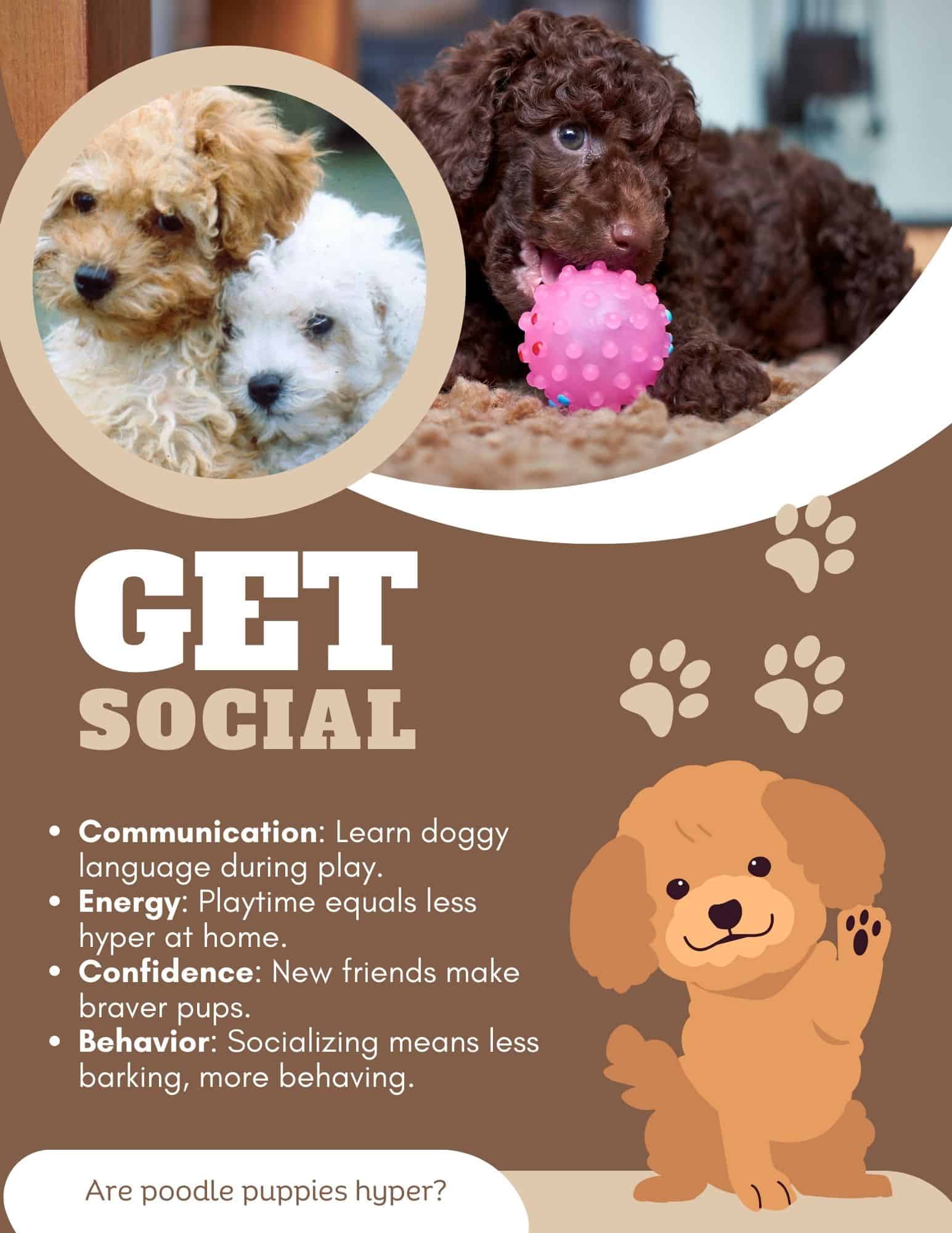
Socializing your poodle puppy is a big part of helping them grow up to be a well-behaved dog. When they meet and play with other dogs at places like a dog park, or even when they interact with other pets at home, they learn a lot.
They learn how to make friends, how to play nicely, and how to understand and follow the rules of doggy behavior.
Here’s what you should know about the benefits of socialization:
Learning to Communicate: Puppies learn how to talk to each other in their own way. They understand when to play, when to back off, and how to tell if another dog is friendly or not.
Burning Energy: Playing with others is a great way for your puppy to use up energy. They’ll run, jump, and play, which helps them be more relaxed at home.
Developing Confidence: Meeting new friends and exploring new places helps puppies become more confident. They learn that the world is fun and not something to be scared of.
Preventing Bad Behavior: Puppies that get enough social time are less likely to do things like bark too much or be afraid of strangers. They’re happier and better behaved because they know how to act around others.
To help your puppy, take them to safe places where they can meet and play with other dogs. Make sure they’re up to date on their shots first, and keep an eye on them while they play.
Start when they’re young so they grow up knowing how to be a good dog friend. This will help them be a happier, calmer, and more well-behaved member of your family.
Training and Obedience Impact
Training and teaching obedience to your poodle puppy is very important. It helps them understand what you want them to do. This can include basic commands like sit, stay, come, and more.
Training doesn’t just teach them commands, though. It also helps them understand how to behave, which can make them calmer and less hyper.
Here’s how training and obedience impact your puppy:
Understanding Rules: Training helps puppies learn what is expected of them. They understand the rules and how to follow them.
Mental Exercise: Learning new things is a great workout for their brain. It helps use up some of their energy and keeps them interested and engaged.
Building a Bond: Training is a special time for you and your puppy. It helps you understand each other better and strengthens your relationship.
Reducing Bad Behavior: Well-trained puppies are less likely to do things like jump on people or bark too much. They know how to behave well because they’ve been taught.
To get the best results, start training your poodle puppy early. Be patient and consistent. Use positive methods like treats and praise to encourage them.
You might also consider joining a class or getting help from a professional trainer. With the right training, your puppy will grow up to be a well-behaved and happy dog.
Diet and Nutrition’s Role in Behavior
The food you give your poodle puppy has a huge effect on their health and how much energy they have.
Just like with people, eating the right foods can make them feel good, while eating the wrong foods can make them feel bad or too hyper. A balanced diet helps keep their energy levels steady and healthy.
Here’s why diet and nutrition are so important:
- Right Nutrients: Puppies need a mix of protein, fats, and carbohydrates, plus vitamins and minerals. This helps them grow strong and healthy.
- Energy Levels: The right food gives them the energy they need to play and learn. But too much food, or food that’s high in sugar, can make them too energetic.
- Behavior: Puppies that eat well tend to behave better. They’re not as cranky or hyperactive because they feel good and comfortable.
- Health: Good food keeps puppies healthy. It helps their bones grow strong, keeps their coat shiny, and helps prevent sickness.
Here’s what you can do to make sure your puppy is eating well:
- Quality Food: Choose a high-quality puppy food that’s right for their age, size, and breed. Look for natural ingredients and the right balance of nutrients.
- Regular Meals: Feed them at the same times every day. This helps keep their energy levels stable.
- Right Amounts: Don’t overfeed your puppy. Too much food can lead to weight gain and hyperactivity.
- Fresh Water: Always have fresh water available. Staying hydrated is just as important as eating right.
By paying attention to what your puppy eats, you can help them be healthier and happier. This means they’ll be more likely to behave well, and you’ll both enjoy your time together more.
Talk to your vet about the best food for your puppy and any other questions you have about diet and nutrition. They can help you make sure you’re doing everything right for your furry friend.
The Role of Sleep in Managing Hyperactivity
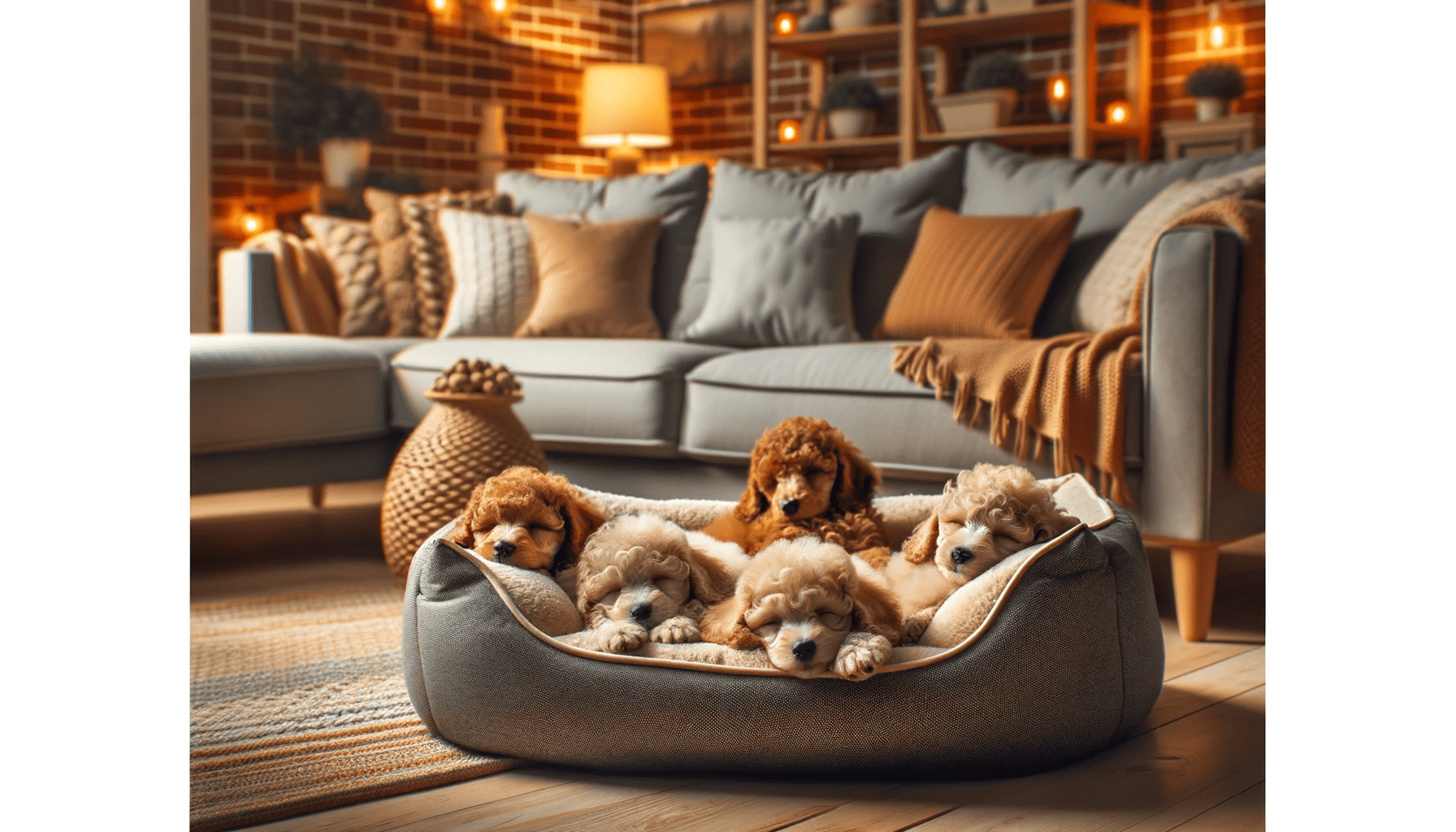
Just like children, poodle puppies need plenty of sleep to grow and stay healthy. Sleep helps them process all the new things they’ve learned and gives their body time to rest and rebuild.
When puppies don’t get enough sleep, they can become cranky and hyperactive, just like a tired toddler might. They might have more trouble controlling their impulses and behave more wildly as a result.
Sleep is crucial for their brain development, immune system, and overall temperament. It helps regulate their mood and energy levels.
When they get enough rest, they’re more likely to have a balanced amount of energy and be more receptive to training and learning.
Here’s a simple table showing the general sleep requirements for poodle puppies at different ages:
| Puppy Age | Hours of Sleep Needed |
|---|---|
| 0-2 weeks | 20-22 hours per day |
| 3-12 weeks | 18-20 hours per day |
| 3-6 months | 16-18 hours per day |
| 7-12 months | 14-16 hours per day |
| Adult | 12-14 hours per day |
Puppies sleep a lot, much more than adult dogs. They need this time to grow and stay healthy. As they get older, they’ll need less sleep, but even adult dogs need a good amount of rest.
Here are some tips to help your puppy get good sleep:
- Create a Quiet Space: Make sure they have a comfortable, quiet place to sleep without too many distractions.
- Establish a Routine: Try to let them sleep and wake up at the same times every day. Routine helps their body understand when it’s time to rest.
- Watch for Overstimulation: Sometimes puppies get so excited or stimulated that they have trouble calming down. Help them relax by creating a calm environment, especially as it gets closer to bedtime.
By ensuring your puppy gets enough sleep, you’re helping them stay happy, healthy, and well-behaved. If you’re ever concerned about your puppy’s sleep or behavior, talk to your vet. They can give you advice and help make sure your puppy is doing well.
Are Poodle Puppies Hyper? Managing Their (almost endless) Energy
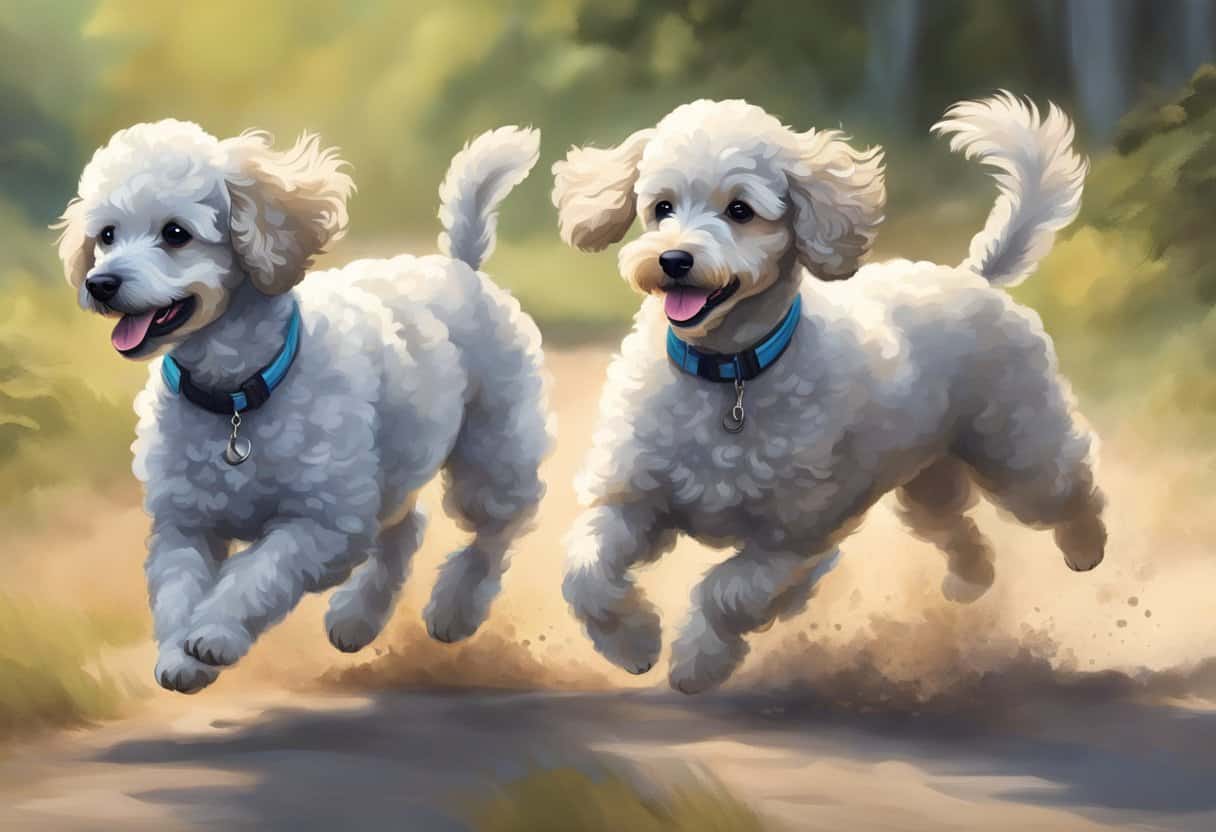
Poodle puppies are known for their spirited personality. Learning to manage their energy can lead to a more harmonious household and a happy, well-adjusted dog.
Establishing a Routine for Your Poodle
Your poodle puppy thrives on a consistent routine. Schedule regular meal times, walks, and bedtime to foster a sense of security. This predictability helps your pup understand when it’s time to be active and when it’s time to calm down.
Effective Exercise Routines for Poodles
Poodles have high exercise needs, requiring at least one daily walk. Break up their physical activity into multiple sessions throughout the day, mixing a brisk walk with playtime to keep it engaging.
- Morning: A brisk 30-minute walk.
- Afternoon: Playtime in a fenced yard.
- Evening: A relaxed stroll or fetching games.
Mental Exercise and Games
Leverage your poodle’s intelligence with mental exercises using puzzle toys or interactive games. These can include:
- Puzzle toys: Stimulate their problem-solving skills.
- Hide-and-seek: Enhance their curiosity and tracking ability.
Training and Obedience as Stimulation
Incorporate obedience training into daily routines. Teach commands like ‘sit’, ‘stay’, ‘come’, ‘heel’ along with tricks to provide both mental and physical stimulation. Agility or rally can advance their skills further.
Behavior Modification Techniques
When dealing with the question “Are poodle puppies hyper?”, it’s important to consider behavior modification techniques that can help manage their high energy levels.
Positive reinforcement is a powerful method to encourage desired behaviors in your puppy. This approach focuses on rewarding good behavior rather than punishing the bad, which can be more effective and helps to build a stronger bond between you and your puppy.
Here’s how you can use positive reinforcement to help your hyper poodle puppy:
- Identify Desired Behavior: Figure out what calm behaviors you want to encourage. This might be sitting quietly, lying down, or playing gently.
- Choose the Right Rewards: Find out what motivates your puppy. Some might love treats, others might prefer toys or praise. Use these as rewards to encourage the behavior you want.
- Be Consistent: Always reward good behavior immediately so your puppy makes the connection between the action and the reward. Consistency is key in training.
- Gradually Increase Challenges: Start in a quiet environment to make it easy for them to succeed. As they get better, you can add more distractions.
- Redirect Energy: Instead of waiting for hyper behavior to start, preemptively engage your puppy in a positive activity. Offer them toys, play a game, or start a training session.
- Be Patient: Behavior modification takes time. Be patient with your puppy and don’t expect immediate changes.
By employing these techniques consistently, you can help answer the question “Are poodle puppies hyper?” with a more nuanced understanding. Yes, they might naturally have a lot of energy, but with the right approach, you can channel this energy into positive behaviors.
Over time, the hyperactivity can be replaced with calmness, creating a more harmonious environment for both you and your puppy.
Calming Strategies and Tools
If you’re questioning, “Are poodle puppies hyper?”, it’s important to recognize that while they naturally possess a lively spirit, there are effective methods to soothe and manage their energetic nature.
Utilizing Calming Vests
How They Help: Calming vests apply a gentle hug-like pressure, offering comfort and reducing anxiety and hyperactivity.
When to Use: Best used in stressful situations like loud events or during anxious moments.
Designating a Dog Bed for Quiet Time
Benefits of a Dedicated Space: A specific dog bed helps your puppy learn to associate that place with calmness and rest.
Creating the Right Environment: Ensure the bed is cozy and placed in a tranquil area of your home.
Soothing Through Sound
Music and White Noise: Playing soft, consistent music or white noise can have a calming effect on your puppy.
Choosing the Right Sounds: Select sounds that are gentle and non-disruptive to avoid overstimulation.
Incorporating Calming Treats
What’s Inside: Choose treats that contain natural calming ingredients like chamomile or L-Theanine.
Vet Advice: Always consult your vet before introducing these treats to your puppy’s diet.
Engaging with Puzzle Toys
Mental Engagement: Puzzle toys are excellent for redirecting your puppy’s energy into a focused, calming activity.
Choosing the Right Toy: Select puzzles that match your puppy’s age and cognitive ability.
Committing to Regular Exercise
Physical Activity: Consistent exercise through walks and play helps burn off excess energy.
Post-Exercise Calm: Puppies typically relax more easily after a good bout of physical activity.
Massage and Gentle Petting
Touch Therapy: Calm, soothing strokes or gentle massages can help relax your puppy.
Learning Techniques: Familiarize yourself with gentle massage methods suitable for puppies.
By adopting these calming strategies and tools, you can effectively guide your poodle puppy towards more relaxed behaviors.
Consistency in these practices is crucial. If you continue to face challenges, don’t hesitate to seek guidance from professional dog trainers or veterinarians for additional support and tailored advice.
Introducing Calmness Through Repetition
Consistency is key. Repeat calming activities at the same time each day, so your poodle learns when it’s time to wind down. This repetition solidifies the calm behavior you’re aiming to establish.
Creating a Stimulating Environment
Design a stimulating play area with ample toys to satisfy their need for physical and mental stimulation. Rotate the toys to keep their environment interesting:
- Exercise zone: Space for free movement.
- Toy corner: Range of toys for varied physical and mental exercise.
Are Poodle Puppies Hyper? When to Call in the Professionals
When dealing with the high energy levels of poodle puppies and their sometimes hyper behaviors, it’s crucial to know when to seek professional help and benefit from structured training classes.
Benefits of Professional Obedience Classes
Professional obedience classes offer numerous advantages for you and your poodle puppy. Firstly, these classes provide a systematic approach to training, stressing the importance of consistency and patience.
In a controlled environment, puppies learn basic commands which are vital in managing their exuberant energy. Trainers also teach you how to reinforce these behaviors positively without causing frustration or anger.
- Enhanced Socialization: Pups interact with other dogs, which is essential for their social development.
- Focused Attention: Trainers can dedicate time to address your puppy’s specific needs.
- Structured Learning: A step-by-step curriculum aids in your puppy’s understanding and retention of commands.
When to Consult a Veterinarian or Behaviorist
Consulting a veterinarian or behaviorist is advisable when you notice any abrupt changes in your poodle puppy’s behavior that training doesn’t alleviate. This could include extreme hyperactivity or sensitivity that doesn’t respond to normal training routines.
A veterinarian may help rule out any underlying medical issues, while a behaviorist could assist with tailored behavioral modification plans.
| Signs to Consult a Pro | Action to Take |
|---|---|
| Excessive hyperactivity | Schedule a vet check-up. |
| Unresponsiveness to basic commands | Set up a consultation with a behaviorist. |
The Role of Breeders and Training at an Early Age
Breeders play a key role in a puppy’s early development. Reputable breeders start the training process from an early age, which can set a solid foundation for future obedience.
It’s vital to continue their efforts by enrolling your poodle puppy in training classes as soon as they are old enough. The younger they start, the better they adapt and learn, reducing potential behavior problems related to hyperactivity.
- Initial Training: Breeders often begin simple training exercises.
- Transition to Your Training: It’s your job to continue this education and reinforce good behavior patterns.
Frequently Asked Questions
When considering poodle puppies, you might wonder about their energy levels and how to manage their hyperactivity.
Are Some Poodle Varieties More Hyper Than Others?
Yes, toy poodles often appear more energetic due to their size, having quick bursts of energy. Standard poodles may seem less hyper but require more physical exercise. Miniature poodles fall somewhere in between, with a balance of lively behavior and exercise needs.
How Can I Calm Down a Hyper Poodle Puppy?
To calm a hyper poodle, you can:
- Implement regular exercise routines.
- Offer calming strategies such as chew toys or puzzle feeders.
- Maintain a consistent daily schedule to provide a sense of security.
At What Age Will My Poodle Puppy Start to Calm Down?
Generally, poodles begin to calm down as they reach maturity, around 18-24 months of age. However, the exact timing can vary based on individual temperament and training efforts.
Can a Lack of Exercise Cause Hyperactivity?
Absolutely, a lack of exercise can lead to hyperactivity in poodles. Regular physical and mental stimulation is crucial for maintaining their well-being and curbing excessive energy levels.
Conclusion to “Are Poodle Puppies Hyper?”
Poodle puppies tend to be lively and playful, which can sometimes be interpreted as hyper. They are brimming with energy and demonstrate an eager personality, which makes them excellent companions for active individuals and families.
If the question, are poodle puppies hyper, comes to mind remember that engaging in regular exercise and play is vital to keep these pups happy and healthy.
- Personality Traits: Poodles exhibit intelligence and are often easy to train, although they can display bursts of energy.
- Lifestyle Adaptation: Their adaptability means they can fit well into various lifestyles, especially those that provide physical and mental stimulation.
- Family and Community: Poodles usually thrive in a family setting and can contribute positively to their community due to their sociable nature.
You must remember to provide ample opportunity for physical exercise and mental enrichment to ensure your poodle puppy grows into a well-rounded dog.
Consistency in training and socialization will also help mitigate excessive bursts of energy and ensure your poodle integrates well into your family and community life.
-

Coffee Mug – In Dog Coffees I’ve Only Had One
Price range: $11.95 through $14.95 Select options This product has multiple variants. The options may be chosen on the product page
